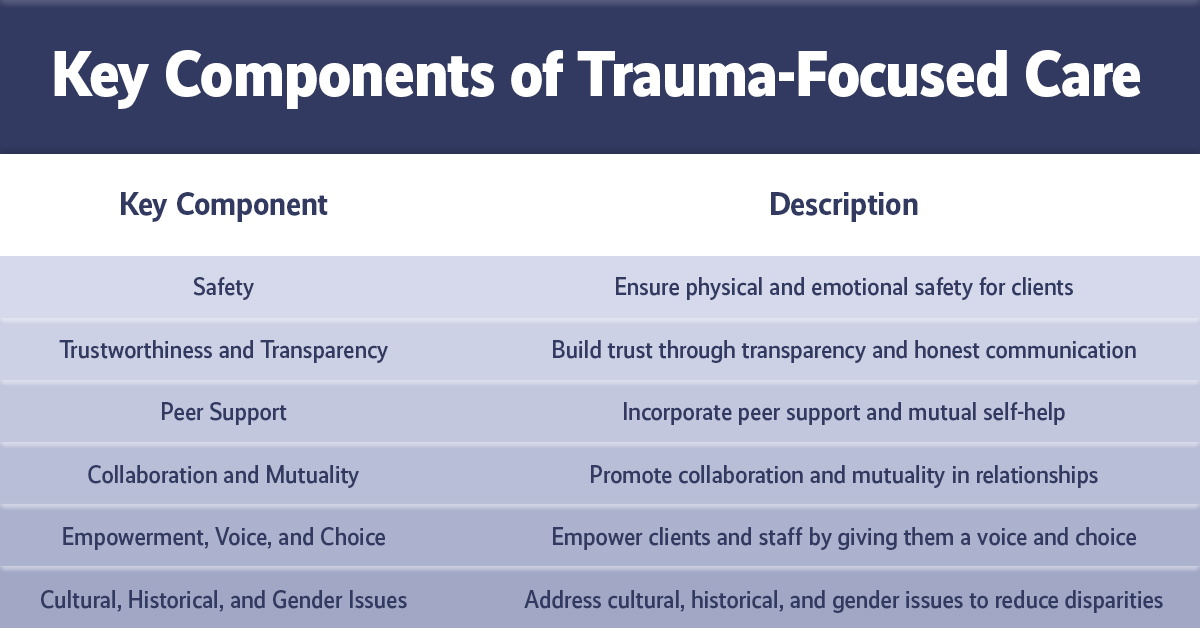What is Trauma-Focused Care?
Have you ever wondered, What is trauma-focused care? Trauma-focused care is a transformative approach in behavioral health that prioritizes healing and recovery. It moves away from traditional methods that might unintentionally re-traumatize individuals. Let’s dive into what trauma-focused care means and why it’s so crucial to an individual’s healing journey.
Understanding Trauma-Focused Care
Defining Trauma-Focused Care
What Does Trauma-Focused Care Mean?
Trauma-focused care understands and considers the widespread impact of trauma. It creates environments that promote healing rather than causing further harm. Unlike traditional care, trauma-focused care shifts the question from “What’s wrong with you?” to “What happened to you?” This change fosters empathy and understanding, crucial for effective treatment.
We understand that trauma affects everyone differently. There is no one size fits all to trauma focused care. Learn more about Triony’s trauma-informed programs.
Principles of Trauma-Focused Care
Core Principles
Safety
Safety is paramount. Both physical and emotional safety are essential in trauma-focused care environments. Patients must feel safe and secure to begin healing.
Trustworthiness and Transparency
Building trust through clear, honest communication is also vital. Transparency in decisions and actions helps establish this trust.
Empowering clients by offering choices and encouraging collaboration in their care plans is a cornerstone of trauma-focused care.
Empowerment and Resilience
Fostering clients’ strengths and resilience is crucial. It’s about building them up, not just treating symptoms.

The Need for Trauma-Focused Care
Why it’s Essential
Trauma is more common than you might think. Many individuals seeking behavioral health services have experienced some form of trauma in their lifetime. Trauma can deeply affect mental health, substance use, and overall well-being. Addressing trauma is key to effective treatment.
Implementing Trauma-Focused Care in Organizations
Steps to Becoming a TF Organization
Leadership and Commitment
Commitment from top leadership is essential. Organizations need to invest in becoming trauma-focused at every level. Prioritizing staff well-being and providing ongoing education on trauma-focused care is also important. A well-trained team can make a huge difference. Check out the team at Triony Behavioral Health.
Creating Safe Environments
Ensuring both physical and emotional safety in care settings helps foster healing. Safe environments are a must.
Inclusive Policies and Practices
Incorporate diversity, equity, inclusion, accessibility, and justice (DEIAJ) in all policies and practices. This ensures everyone feels seen and valued.
Addressing Re-Traumatization
Understanding and Preventing Re-Traumatization
What is Re-Traumatization?
Re-traumatization happens when a situation triggers memories of past trauma. This can activate the body’s survival response. To prevent re-traumatization, avoid practices like restraints or isolation. Be mindful of specific triggers, such as certain smells or sounds.
Benefits of Trauma-Focused Care
Positive Outcomes
There are many positive outcomes of trauma-focused care. Clients experience improved engagement, better treatment adherence, and overall enhanced health outcomes. Providers and staff also benefit from reduced burnout, lower turnover rates, and improved well-being.
Trauma-focused care is changing the landscape of behavioral health. By prioritizing empathy, safety, and collaboration, we can create better outcomes for everyone involved! To learn more, reach out to Triony Behavioral Health at 888-689-1432.
More Resources:
Schedule consultation
Building a Foundation of Trust and Support
"In the midst of chaos, there is also opportunity." At the core of our services lies a deep commitment to creating a safe, supportive environment. We believe that a strong support system is crucial for healing and growth. Our team of compassionate professionals is dedicated to walking alongside you, offering guidance and understanding at every step of your journey.





